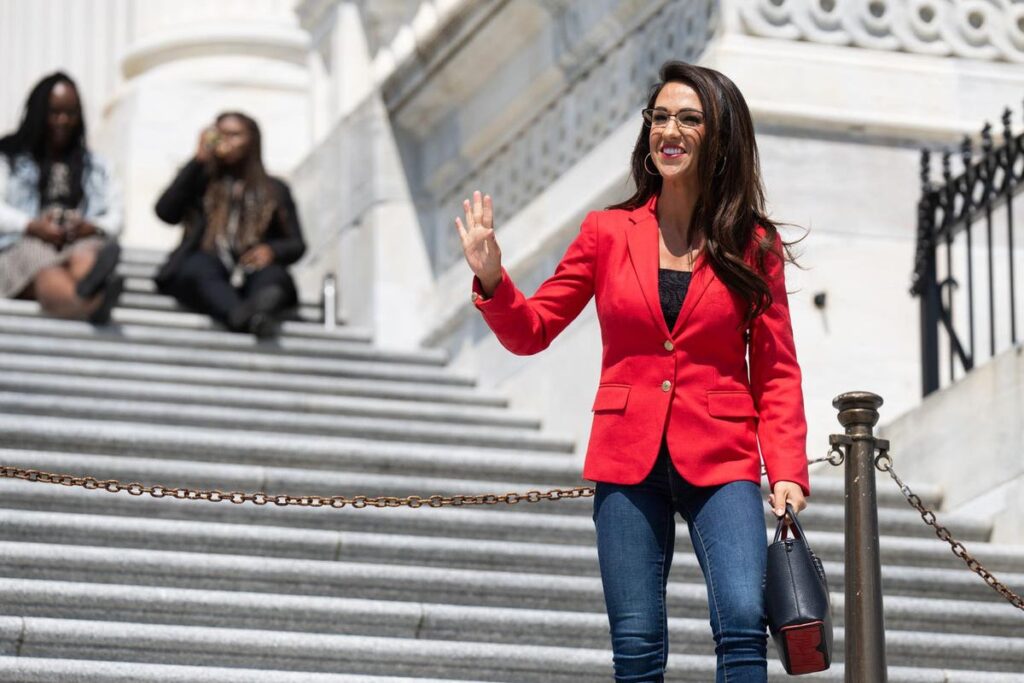During a recent House hearing, Rep. Lauren Boebert, R-Colo.., told a story about what led to her … [+]
Apparently the costs of certain medications left Rep. Lauren Boebert (R-Colorado) out of control once—meaning out of birth control. During a House Oversight and Accountability hearing on May 23, Boebert recalled, “I left a prescription at a pharmacy once. I went to get birth control. I was there at the counter, went to pay for it, and the price was very, very high. I said wow, is this a three-, six-month prescription?” She continued with, “They said, no ma’am, this is one month. I said it’s cheaper to have a kid. And I left it there, and now I have my third son, Kaydon Boebert, and so it actually turned out to be a really great thing.”
OK, let’s be clear. It is not “cheaper to have a kid” than purchase birth control medications by any means, assuming that you aren’t going to just leave your kid without clothes out in the yard to forage for food amongst the squirrels. According to the U.S. Department of Agriculture (USDA), in 2015, it cost a middle-income two-child married couple around $12,980 a year to raise a child. To put things in proper perspective, that’s equivalent to the cost of purchasing around 12,980 miniature scented candles each year. In this case, middle-income meant earning somewhere between $59,200 and $107,400 annually.
Of course, when you have a kid, we’re not talking about a single outlay of costs for just a single year. You won’t be telling your kid when he or she reaches two years of age, “You’ve squatted in this home for long enough. Time to go out and make a living for yourself.” No, that doesn’t come until the kid is at least 17. Or 21. Or perhaps 30 or 35, these days. The estimated cost of providing a child born in 2015 with food, shelter, and other necessities all the way up to age 17 was estimated to be $233,610. This bumped up to $284,570 if you had factored in inflation at the time, which certainly is higher now. All of this didn’t include the cost of a college education either.
Unless, your method of birth control happens to be riding in blimp so that no one can reach you to have sex or you use about 35 condoms a day, birth control is probably not going to cost you over $12,980 a year. So, you don’t want to follow the “cheaper to have a kid” mantra. Don’t just forego birth control and then later tell the resulting kid, “Yeah, you’re around because I didn’t have enough cash in my pocket that one day.”
However, Boebert did have a point that birth control costs could end up being a deterrent to using birth control for many. A piece written by Sasha Guttentag, PhD, and published on April 6, 2021, described how GoodRx Health used data from the Medical Expenditure Panel Survey (MEPS) 2017-2018 to estimate the annual costs of different birth control methods. Of course, the costs that you face would depend heavily on whether you have insurance and how much such insurance would cover your costs. It also varies significantly based on what type of birth control you may use. This analysis found that those without insurance could spend annually on average $268 for birth control pills, $200 for an intrauterine device (IUD), over $2,000 for vaginal rings, $560 for birth control patches, $245 for birth control shots, $52 for male condoms, or $531 for female condoms. These numbers don’t even factor in doctor’s visits. Again, while these are certainly not raise-a-kid level costs, they are not insignificant. Even if you do have insurance, many plans still leave you paying a not insignificant portion of the birth control costs. For example, those with insurance still had average annual out-of-pocket expenditures of $226 for birth control pills, according to the GoodRx Health analysis.
Rep. Alexandria Ocasio-Cortez (D-NY) had a response to Boebert’s story. (Photo by Nathan … [+]
Now, after Boebert had told her third son story, Rep. Alexandria Ocasio-Cortez (D-New York) took to Twitter to question why Boebert had voted against the The Right To Contraception Act that was sponsored by Rep. Kathy Manning (D-North Carolina):
The Right To Contraception Act did pass the House of Representatives last Summer 228-195 in a vote that fell, surprise, surprise, largely along political party lines because how many votes fall along political party lines these days, right? The Act sought to federally establish everyone’s right to contraception. This Act had emerged after U.S. Supreme Court Justice Clarence Thomas had suggested revisiting the 1965 Griswold v Connecticut Supreme Court ruling that has forbidden states from banning contraception.
Not having proper access to birth control could lead your life to being out of control in many ways. Raising a kid is by no means an easy thing to do. It is a real commitment financially, personally, and socially and could lead you to watching way too may episodes of The Wiggles and Little Baby Bum. It could end up changing your lives in so many ways for better or for worse, depending on your situation and how prepared you are to handle it. So the decision to use birth control really shouldn’t come down to how much money you happen to have available on a particular day. You don’t want to end up naming your kid “Max” after credit card being maxed out that day.


